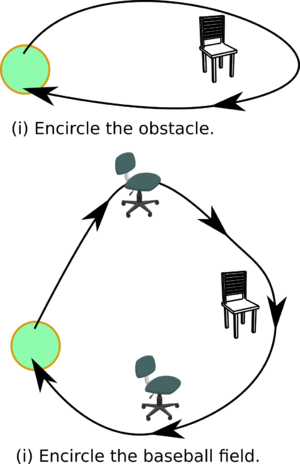Drive a given path: Difference between revisions
From wikiluntti
No edit summary |
No edit summary |
||
| Line 27: | Line 27: | ||
=== Exercises === | === Exercises === | ||
* Clock the time and try to get fastest possible time. | * Clock the time and try to get the fastest possible time. | ||
* Measure the difference between the starting point and ending point. | * Measure the difference between the starting point and the ending point of the robot. | ||
* Make N (e.g. five) laps around the obstacle. Measure the (i) time or (ii) distance between starting and ending points. | * Make ''N'' (e.g. five) laps around the obstacle. Measure the (i) time or (ii) distance between starting and ending points. | ||
Revision as of 20:16, 4 September 2020
Introduction
The robot should drive the path given in advance. The path can be of any shape, but some simple paths are preferred, as the robot will eventually fail due to the tolerance. The paths given here are an obstacle and baseball field, also encircling the obstacles.
Robot
Almost any robot will do. This example is done with Asimov 2/ Verne.
Sensors
No sensors is used.
Example Videos
Theory
Encircling one obstacle is rather easy, and can be done using only one programming block. However, more speed and accuracy is gained by using more programming blocks.
Encircling the baseball field is more advanced, but still rather easy job to do.

Example Code
Exercises
- Clock the time and try to get the fastest possible time.
- Measure the difference between the starting point and the ending point of the robot.
- Make N (e.g. five) laps around the obstacle. Measure the (i) time or (ii) distance between starting and ending points.
This course is supported by Meet and Code. The course is made in collaboration with Robotiikka- ja tiedekasvatus ry.
